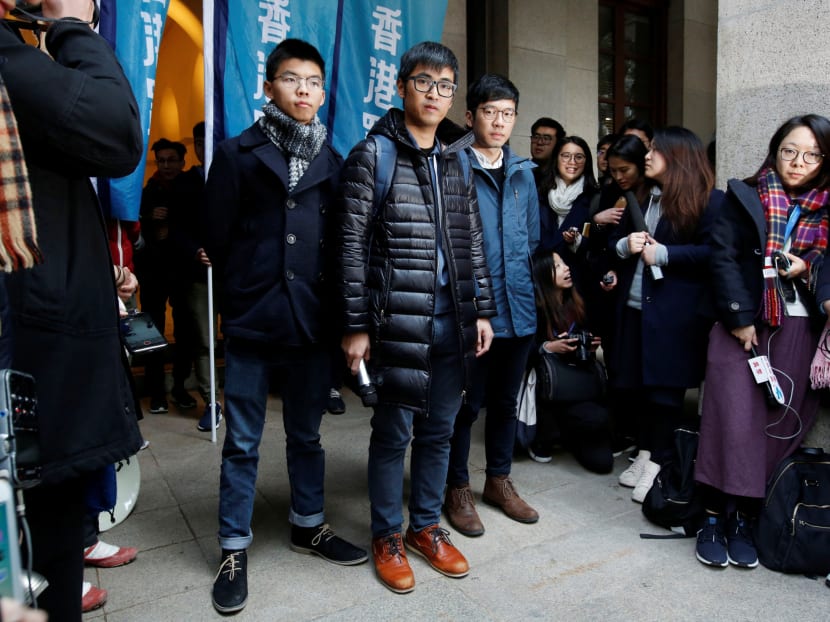Court ruling for Hong Kong democracy activists could have ‘chilling effect’ on social activism
HONG KONG — A judgment delivered by Hong Kong’s top court as it set free three young pro-democracy activists drew mixed reactions from legal experts on Tuesday (Feb 6), with one saying it could have a “chilling effect” on future protests, while another praised it for making clear that the law could not be applied retrospectively.

Pro-democracy activists (L-R) Joshua Wong, Alex Chow and Nathan Law pose outside the Court of Final Appeal. Legal experts say a judgment delivered by Hong Kong’s top court as it set the trio free could have a “chilling effect” on future protests. Photo: Reuters
HONG KONG — A judgment delivered by Hong Kong’s top court as it set free three young pro-democracy activists drew mixed reactions from legal experts on Tuesday (Feb 6), with one saying it could have a “chilling effect” on future protests, while another praised it for making clear that the law could not be applied retrospectively.
On Tuesday, the Court of Final Appeal quashed jail terms for Mr Joshua Wong Chi-fung and two allies imposed by a lower appeal court on August 17 last year for their roles in the 2014 protests known as the Umbrella Movement.
The five judges said that while they agreed with the lower court’s stricter sentencing guidelines for unlawful protests, it was inappropriate to apply these to the three men and impose jail time on them for storming a government complex in the run-up to the 2014 pro-democracy Occupy protests.
They stressed, however, that Hong Kong was a law-abiding society and that “future offenders involved in large-scale unlawful assemblies involving violence” will be subject to stricter guidelines laid down by the Court of Appeal.
Senior counsel Ronny Tong Ka-wah said the judgment put to a rest a “controversial issue”.
“(It makes clear that) when those who exercise their freedom use violence, no matter how noble their intentions are, that can no longer be a mitigating factor,” Mr Tong, a member of Chief Executive Carrie Lam Cheng Yuet-ngor’s cabinet, said.
Professor Michael Davis, formerly with the University of Hong Kong’s law school, said the ruling in principle should have no negative effect on non-violent rallies in Hong Kong but it may inadvertently have a “chilling effect” on people who wanted to participate in protests.
“It clearly sends a signal of caution for those interested in engaging in civil disobedience, and would presumably erase the expectation that a light sentence will follow because of the worthiness of the cause.”
He also acknowledged concerns that authorities may use these tougher guidelines to silence political opposition.
“Through the 2014 government democracy proposals, expulsions of legislators and harsh sentencing practices, the authorities have certainly caused concern that their objective is to silence and contain opposition,” he said.
“Will they now try to characterise the innocuous acts of protest as violent and ride roughshod over protesters? That is yet uncertain. Hopefully not.”
Mr Wong Kai-yeung, a key member of Law Lay Dream, a rising legal commentary group consisting of lawyers, academics and students, argued that the court’s endorsement of stricter sentencing guidelines was not in keeping with the international community.
“In England and Wales, as well as in the European Court of Human Rights, violence, especially if it’s not directed at people but is only an incidental part of the protest, is but one factor in the sentencing exercise.
“The line drawn in England and Wales is not whether violence was used at all, but whether you had intended to hurt people by that violence,” Mr Wong Kai-yeung said, adding that the offender’s lofty motives behind the offence would render it necessary for the court to suspend the sentence.
His view was echoed by Progressive Lawyers Group convenor Craig Choy Ki, who feared that the ruling would further restrict people’s rights to peaceful assembly as guaranteed under International Covenant on Civil Rights, to which Hong Kong is a signatory.
University of Hong Kong principal law lecturer Eric Cheung Tat-ming said a significant takeaway from this judgment was how it made clear that in a common law system like Hong Kong’s, laws could not be applied retrospectively.
“The judgment affirms that the goalposts cannot be moved,” he said.
The scholar said the judgment came at a time when this concept was under challenge in other areas. For example, there was a heated debate months ago on whether a potential national anthem law should be enforced retrospectively when it was passed. SOUTH CHINA MORNING POST






